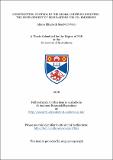Constructing control in the global shipping industry : the development of regulations for CO₂ emissions
Abstract
Shipping transports between 80-90% of world trade (Smith et al. 2015). In 2012 the
industry accounted for around 3% of global emissions with a predicted increase of
between 50 and 250% by 2050 (Scott et al, 2017). As such, the question of how to
regulate Shipping’s CO₂ emissions in line with international climate change agreements
(e.g. the Paris Agreement) is of major concern.
Current CO₂ regulations have been criticized as ineffective (Devanney 2010) with
growing calls for new regulations (Cullinane & Cullinane 2013; Wan et al. 2018).
Existing literature on the regulation of Shipping tends towards impact assessments,
scientific critiques and general overviews. This thesis contributes an ethnography of the
development of new regulations. Ontologically constructionist, the research is guided
by Actor-Network Theory, chosen for its applicability in scientific and technical
communities, appreciation of non-human agency and its conceptualization of control
through networked heterogeneity. The thesis follows development of new regulations in
the Marine Environment Protection Committee (MEPC) of the International Maritime
Organization (IMO). Directed by two questions ‘What actors constitute the MEPC?’
and ‘How does it create regulations?’ the thesis offers an account of the actors and
processes that enable the construction of control over Shipping emissions. This account
is produced from observational, interview, documentary and photographic data.
The study contributes to the limited literature on Shipping regulation in three ways: (i)
examining actor-roles in the network; (ii) illustrating network convergence informed by
sociological framings of translation (Callon 1986a) and treason (Galis & Lee 2013);
and (iii) tracing the agential qualities of concepts and principles enacted and acting in
the MEPC. Their shared characteristics are distilled to create the typology: Meta-actor
which strengthens the descriptive capabilities of ANT, extends the core principle of
symmetry, facilitates new identifications of networked power, and illustrates a link
between influence and vulnerability. Overall the thesis shows how a heterogeneous
network of actors converges to produce regulation for the reduction of CO₂ emissions
from Shipping.
Type
Thesis, PhD Doctor of Philosophy
Collections
Items in the St Andrews Research Repository are protected by copyright, with all rights reserved, unless otherwise indicated.

